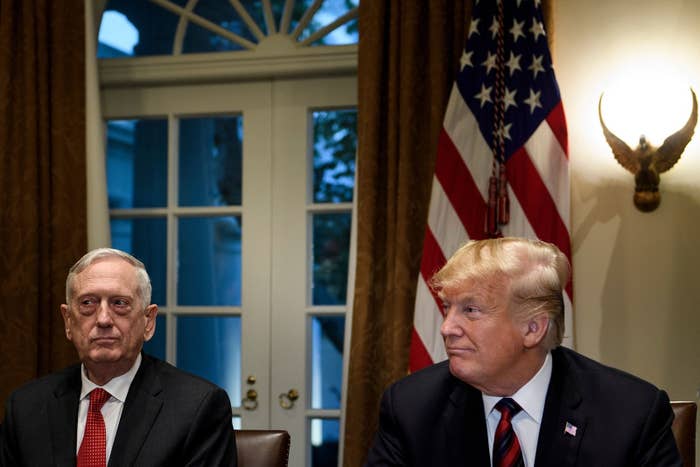
The Trump administration on Friday asked the Supreme Court to take up three cases challenging the administration’s repeated efforts to bar transgender people from serving in the military. The move is the latest unusual filing at the high court by an administration that appears eager to leapfrog over appeals courts that have previously sided with challengers to the administration’s policies.
The effort to reverse Obama-era policies allowing for open transgender military service began when President Donald Trump tweeted out news of the ban in July 2017 and has been met with heavy skepticism from courts around the country since that morning.
Friday’s filings are the administration’s attempt to get the issue before the justices during the current Supreme Court term, which would mean a decision would be expected by June 2019 — if the justices agree to take one or more of the cases.
The requests in all three cases come to the justices in an unusual posture. Normally, after an appeals court rules, the losing party chooses whether or not to ask the Supreme Court to review the matter. Here, the request comes in the form of petitions for certiorari before judgment, meaning that the department is asking the Supreme Court to review the case before appeals courts have had the chance to rule on the matter.
While the practice is disfavored — under Supreme Court rules, such review is only granted if a party can show “the case is of such imperative public importance as to justify deviation from normal appellate practice and to require immediate determination in this Court” — the Justice Department in the Trump administration has regularly gone to the high court seeking action before the appeals courts have weighed in. At times, the Supreme Court has rebuffed those attempts, as it did in a challenge to the administration’s attempt to end the Deferred Action for Childhood Arrivals (DACA) program, sending the matters back to the lower courts before it weighs in.
The initial attempt to ban all transgender troops was met with injunctions from courts around the country, leading the administration to attempt a second version of the ban, which the Justice Department on Friday asked the Supreme Court to review.
Under that policy, recommended by Defense Secretary James Mattis in accordance with a memorandum from Trump, most transgender people are barred from service if they transition. It has been no more successful in court, with district court judges keeping injunctions in place or extending them to cover the new policy.
Two of Friday’s filings come in cases out of the US Court of Appeals for the 9th Circuit, which has long been the source of animosity from Trump but flared up into a back-and-forth with Chief Justice John Roberts this week. Arguments were held in one of those appeals on Oct. 10, but the other appeal was only filed on Nov. 16. The third case comes out of DC, where the US Court of Appeals for the DC Circuit is scheduled to hold oral arguments on the Justice Department’s appeal on Dec. 10.
Echoing previous arguments against inclusion within the military, Justice Department lawyers, citing Pentagon policy, wrote in Friday’s filings that “the Mattis policy reflects the military’s reasoned and considered judgment that ‘making accommodations for gender transition’ would ‘not [be] conducive to, and would likely undermine, the inputs — readiness, good order and discipline, sound leadership, and unit cohesion — that are essential to military effectiveness and lethality.’”
Advocates fighting the attempted Trump administration policy change pushed back on Friday’s filing, although their response in court isn’t due for a month.
“There is no urgency here and no reason for the Court to weigh in at this juncture,” Jennifer Levi, GLAD Transgender Rights Project director, said in a statement. “The injunctions preserve the status quo of the open service policy that was thoroughly vetted by the military itself and has been in place now for more than two years.”
